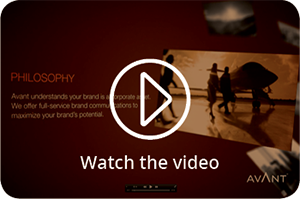What is event management?
Event management is a strategic marketing and communication tool that can help any company, big or small, to reach existing and potential clients. Avant Communication offers a full spectrum of event management options and services, ensuring that, whatever scope or size, your function will be planned and carried out as smoothly, seamlessly and successfully.
Event management, in short, is the creation, development and management of any kind of event. It is a broad term that can refer to anything from organising the launch of a new product, to planning a symposium, to promoting a big music concert. There are a number of areas that need to be covered throughout the process. These can basically be divided into the following:
– Building the event into a brand; that is, giving it a brand identity– Promoting and marketing the event beforehand
– Organising the logistics in the lead-up to the event
– Managing the event itself
– Capitalising on the exposure post-event
Organising an event requires determining a goal, visualising a strategy to achieve that goal, and then developing a step-by-step process that will get you there. When organising an event, it is important that everyone has a similar vision of the work that needs to be done, as well as a desire to see the event through in the most efficient way from beginning to end.
Why is event management important?
Planning even a small party, something that most people at some point in their lives have done, requires a considerable amount of time, effort and planning. From the right location, to guests who are compatible, to the menu, there are a number of things that need to come together in order for the night to be a success. Now imagine you need to organise a conference for 700 people who are flying in from all over the world – in under four months. Then take into consideration you will be working with a budget, will need to cater for people from many different cultures and religions, come up with a central theme for the event, and arrange media coverage, and you can understand why it makes sense to get a company who specialises in this field to take the reins.
Establishing a brand identity for the event
Your event needs a brand identity – a name, a logo, a concept, and a website if necessary – before anything else. It should be able to stand alone as a separate entity, but should still be affiliated with your brand and identifiable as your business’ initiative. In this way, the advertising will be two-fold: the event itself becomes the primary focus, but your business receives secondary recognition through being the party responsible for the event.
Careful thought and consideration needs to go into the design aspect of your brand identity, as this will be the first point of contact that the public will have with the event. The design and concept should tie in with the theme of your event so that a sense of uniformity can be achieved – making the advertising leading up to the event, and finally the event itself, easily identifiable and widely recognised.
Promoting and marketing the event beforehand
Your marketing, advertising and PR set a precedent for your event that can, essentially, make it or break it. The way you position the event will determine the public’s perception of what it will entail, who attends it, as well as whether or not it is something that will gain additional exposure in the press and media. Some aspects that need to be taken into consideration are
– How do I advertise my event?
– Where do I advertise my event?
– What do I want the advertising to say?
– What kind of people do I want to know about, and attend, the event?
– How can I draw crowds and garner media interest?
One thing you need to be careful about is overpromising or creating false expectations. Will you be able to deliver what you’re advertising to potential attendees? Spend some time thinking about this question. Look at your advertising and event from the perspective of someone who’s going to attend or cover it, and then try to determine if you’ll be able to deliver on what you’re promising. It’s all about being clear, realistic and reliable.
The type of event you’re planning will determine where and how you will go about advertising it. For smaller events (and thus, smaller budgets), community newspapers, online marketing and local advertising are often the best route. For something large-scale, you may choose to make use of more traditional, above the line mediums that will be get mass exposure – billboards, television commercials, etc. An event management company will be able to advise you in this regard. Organising the logistics in the lead-up to the event Perhaps the most important thing in the lead-up to your event is to establish what your goal is – that is, what you wish to achieve through your specfic event. Once this has been determined, it should become a lot more evident what steps should be included in the planning process.
Some of the next things that need to be taken into account are the following:
The budget
(How much can you spend, and how should it be allocated?)
The date of the event
(When is the most suitable time to host the event, taking into consideration cost, weather, availability, etc.?)
The location
(What is going to be the best location in terms of cost, availability, centrality, transport options, etc.?)
Logistics
(How will guests get too and from the event? What is needed in terms of signage? Do guests need accommodation? Where will the power sources be located? What catering arrangements need to be made?)
The programme or agenda
(What will the proceedings be? What does the event entail in terms of entertainment? When will meals be served?)
The key message
(What is the central idea or feeling that we want to convey too attendees?)
The media can play a major role in promoting your event by providing messages to the public through newspapers, television, radio public service announcements, etc., so it is important to come to some kind of agreement with the relevant parties. Once you have covered all aspects of planning, the final preliminary duty is continuing communication with the people involved in, and responsible for the event, and following up with your participants, any sponsors and the media.
Managing the event itself
It is crucial that you have a capable, dynamic and reliable team to oversee the actual event. There are always last-minute changes, delays and problems, and having people who are equipped to manage these issues will not only make your life easier, but could, in extreme cases, very well save your event. The day of the event is the culmination of weeks (sometimes months) of hard work and planning. If you have used your time and resources wisely, there shouldn’t be too much left to do besides supervise that everything goes according to plan and then mingle with your guests and make sure they’re happy.
Capitalising on the exposure after the event
After the completion of an event, often those who participated in the planning process feel they have allocated enough time and energy and are ready to move on to bigger and better things. It is important to remember that follow-up evaluations, presentations and reports, as well as the necessary “thank yous” are an integral part of successful event planning. It is also important that your clients are happy with the way the event turned out, and that they feel they have got their money’s worth. Communication here is key – be open with each other about the successes and failures and where and how you can improve next time. Checking the outcomes with the original goal is also a good way of measuring your, and your event’s, success.
How can Avant Communication help you?
As a total event solutions company, Avant Communication is involved in more than just the planning and execution of an event. We also offer our services in the brand building, marketing and communications aspects. Our services span the entire event spectrum:
– Creative design of the conference or event– Planning and management of logistical aspects
– Co-ordinating technical aspects
– Implementation of event plan
– Sponsorship marketing
– Event brand identity development
We undertake extensive research, brainstorm and develop creative ideas. After meticulous planning and conceptualising, we try to bring your ideas to life with impeccable execution. We then manage the entire process up until the actual event, and the follow up and debriefing. We work closely with our clients to develop a thorough understanding of their requirements, goals and objectives. By adapting our strategies and even implementing new innovative ones, we present turnkey solutions for the management of your particular event.





